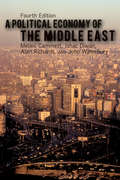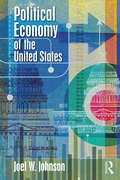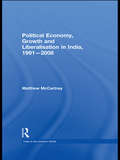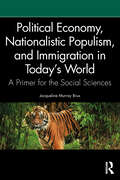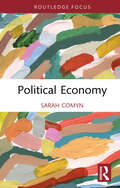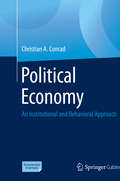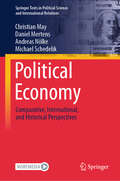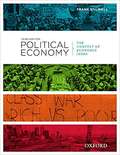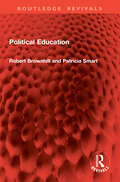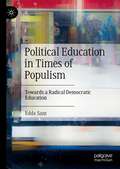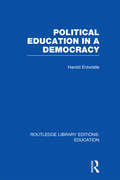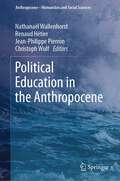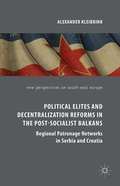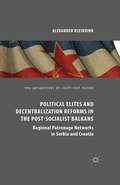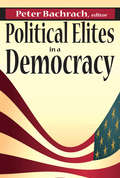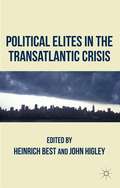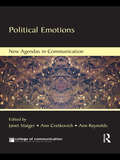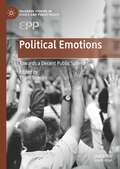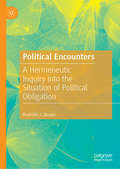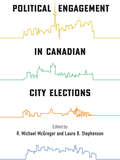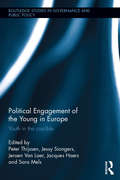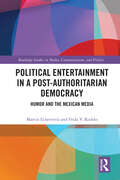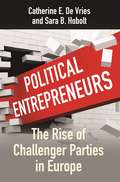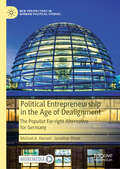- Table View
- List View
Political Economy of the Middle East
by John Waterbury Alan Richards Melani Cammett Ishac DiwanA Political Economy of the Middle East is the most comprehensive analysis of the political economy of development in the contemporary Middle East over the past several decades, examining the interaction of economic development processes, state systems, state policies, and social actors in the Middle East. The fourth edition, with new authors Melani Cammett and Ishac Diwan, has been thoroughly revised, with two new introductory chapters that provide an updated framework with which to understand and study the many changes in demography, education, labor markets, urbanization, water and agriculture, and international labor migration in the recent years. The new edition also includes: a new chapter that charts the political economy of the Gulf states and in particular the phenomenal growth of oil economies; a new chapter on the growth of the private sector and its effects in the region; a new chapter on the rise of "crony capitalism;" and increased coverage of the changes in civil society and social movements in the region including an exploration of the causes, dynamics, consequences, and aftermath of the Arab uprisings.
Political Economy of the United States
by Joel W. JohnsonHow have the policies of recent administrations shaped today’s economy? To what extent has federal policy contributed to growth in income inequality? Why have the parties become so polarized and how has polarization influenced economic policy? <P><P>This book provides an introduction to the contemporary political economy of the United States. It examines the politics of economic policymaking, the influence of federal policies and programs on the economy, and the co-evolution of politics and the economy over the past five decades. Along the way, it explains the causes and consequences of many contemporary phenomena, such as the government’s deficits and debt and the ideological polarization of the parties. <P><P> The book is divided into two parts. The first half explains how America’s political economy "works." It explains what the federal government does, why it does what it does, and how its policies influence the economy. The second half explains "how we got here" with a review of major political and economic developments since the 1970s, all the way up to the early years of the Trump Administration. This weaving together of theory and history provides both the tools and the context so that readers can properly understand the nation’s current-day politics and policy debates.
Political Economy, Growth and Liberalisation in India, 1991-2008 (India in the Modern World)
by Matthew McCartneyThe phenomenal growth and liberalisation of the Indian economy has been the subject of extensive scholarly documentation and competing interpretations. This book examines the key period of liberalisation in India from 1991 to 2008. It analyses the relationship between growth and liberalisation and, in particular, the recent ‘miracle growth rate’ and considers its sustainability in the current Indian economic environment. The book explores and re-evaluates the historical experience of planning in India between 1950 and 1980 as an alternative model of state-led economic development, discusses how far current rapid growth is the result of liberalisation, and how strong the case is for continued liberalisation today. The book is a significant contribution to the growing debate on economic growth and liberalisation, and the broader subject of economic development in India and other developing countries. It will appeal to students, researchers, lecturers and all those interested in South Asia in general and, India, in particular. It is also an essential resource for the study of international political economy and development economics.
Political Economy, Nationalistic Populism, and Immigration in Today's World: A Primer for the Social Sciences
by Jacqueline Murray BruxPolitical Economy, Nationalistic Populism, and Immigration in Today’s World: A Primer for the Social Sciences is a core text for a multidisciplinary range of courses in economics, political science, sociology, international studies, public policy, and the social sciences.The text weaves together an understanding of the interconnected topics of global nationalistic populism, authoritarianism, immigration, conditions in developing countries, social systems and safety nets, diversity, and ultimately, happiness as measured by global happiness surveys.The text is designed for a global audience through the use of examples and case studies in a manner that is clear to students and provides all prerequisite knowledge for undergraduates. It includes content on countries across the developing world, Europe, Canada, and the United States. There is considerable emphasis on the politics and ideologies of Europe and the United States and how these relate to immigration and impact each other.
Political Economy: A Literary History Of Homo Economicus (Short Takes on Long Views)
by Sarah ComynProviding a ‘short take’ on the long history of political economy, this book examines both the stories about and those within economics. It traces the history of political economy from its beginnings in the Scottish Enlightenment; through its disciplinary demarcation as a science in the nineteenth century that saw its differentiation from literary, aesthetic, and moral discourses; and to its emergence as the ‘amoral’ market-driven neoliberalism that dominates economic theories and policies today.In exploring the long history of economic thought, it examines and challenges both Enlightenment and contemporary grand narratives such as the stadial theory of progress, the ‘Great Divergence’ and the ‘Great Convergence’ that have divided the world into global norths and souths according to their economic advantages. It concludes with a study of currency as both a medium of monetary exchange and a term that denotes prevalence and acceptance to explore political economy’s continuous engagement with the problem of representing value through money. Part of the series Short Takes on Long Views, this book will appeal to a traditional academic audience of scholars and students, and to a wider public audience of informed non-fiction readers interested in the long history of economics.
Political Economy: An Institutional and Behavioral Approach
by Christian A. ConradThis textbook takes a new approach to political economy: it combines the well-known non-quantitative theories with the findings of behavioral science and other disciplines such as psychology and sociology. The question of how people behave and how such behavior can be guided towards moral welfare for everyone is the focus of this book. The knowledge is first derived scientifically, then the results are presented in summaries and conclusions. Case studies provide a link to practice. By means of exercises and behavioral games, readers can apply and deepen their acquired knowledge.
Political Economy: Comparative, International, and Historical Perspectives (Springer Texts in Political Science and International Relations)
by Andreas Nölke Christian May Daniel Mertens Michael SchedelikThis textbook offers a comprehensive introduction to Political Economy. It combines comparative,international and historical perspectives into a holistic framework of analysis. Drawing on the workof Karl Polanyi, the book shows how capitalist economies differ around the globe and how they areembedded in the international economic order. Through a critical-institutionalist lens, it helps toaccount for the evolution of contemporary capitalism and addresses current topics at the intersection of political science and economics.Students and instructors can draw on supplementary material, such as Power Point slides withall figures and tables as well as the Springer Nature Flashcards app with exercises.
Political Economy: The Contest Of Economic Ideas
by Frank StilwellNow in its third edition, Political Economy: The Contest of Economic Ideas is a fully updated survey of the political economy and its connection with social concerns. Moving beyond conventional treatments, this unique text offers a "big-picture" overview of the analytical tools and value judgments associated with competing schools of economic thought. Featuring an exceptionally engaging writing style, this text makes the complexities of contesting economic ideas--including classical political economy and Marxist economics and neoclassical economies and neo-liberalism--clear and accessible to students. The third edition includes a new chapter on the economics of happiness and new sections on current issues like the global financial crisis, climate change, and "affluenza."
Political Education (Routledge Revivals)
by Patricia Smart Robert BrownhillA debate has been in existence as to whether political education—or indeed political argument of any kind—should be kept out of the classroom. There are those who argue that political education is synonymous with indoctrination and others who suggest that education is by its nature political. For those who agree that there should be a distinct political aspect of the curriculum which instils political knowledge and awareness, there is of course the question of where the emphasis should be placed. How is it possible to achieve any kind of balance? First published in 1989, Political Education analyses the debate about the introduction of courses in political education to secondary, tertiary, and adult education as well as to youth work. It also examines the introduction of an element of political education to specific subjects. It puts forward an argument for political education and discusses what it should consist of and how it should be undertaken. This book will be of interest to students and researchers of education.
Political Education in Times of Populism: Towards a Radical Democratic Education
by Edda Sant"In professional and academic contexts nothing is more important than helping people to understand and engage with democratic society. Sant has written an excellent book which helps greatly towards that end. She has developed incisive new arguments about the nature of contemporary politics and education. Using the most recent as well as classic literature, she explores key ideas and issues. Through wide ranging discussions and by referring to her own valuable empirical work she characterizes and creates thoughtful insights and innovative pedagogical approaches. This book achieves the very difficult task of illuminating complex ideas at the same time as helping to determine practical ways to achieve social justice through education. Political education has been neglected for too long. This book is a bold new step in its achievement."—Ian Davies, Emeritus Professor, University of York, UKThis book examines political education in times of democratic crisis, polarisation and uncertainty. Using populism as a diagnostic tool, the book scrutinises current democratic practices and considers alternatives for future social studies and citizenship education. The author examines contemporary events including Brexit, the Catalan referendum for independence and protests in Chile to ask how democratic educators can respond to times of crisis. Centered on themes of knowledge and ideology, the book draws together political philosophy and educational research to map out, critically analyse and offer alternatives to dominant debates on political education. It will be of interest and value to scholars examining the relationship between democracy and educational theory and practice.Edda Sant is Senior Lecturer at Manchester Metropolitan University, UK. A former social studies teacher, her research interests lie in citizenship, political and democratic education. She has published widely in this field, and in 2016 was recognized with a Children’s Identity & Citizenship European Association Award.
Political Education in a Democracy (Routledge Library Editions: Education)
by Harold EntwistleIn this volume the author analyzes the relationships of concepts such as socialization and political education, explains those aspects of the theory and practice of democracy that are especially relevant for schools, and suggests ways in which teachers can better provide for the political education of their students.
Political Education in the Anthropocene (Anthropocene – Humanities and Social Sciences)
by Christoph Wulf Nathanaël Wallenhorst Renaud Hétier Jean-Philippe PierronThis book articulates an educational theory as well as a political theory of the Anthropocene. Divided into three sections it addresses educational anthropology, cultures and institutions, and educational recommendations in the Anthropocene. Topics covered in the volume measure the impact of the idea of the Anthropocene on the type of anthropology that underlies education and on a phenomenology of relationship. It links the notion of the Anthropocene with cultures and institutions so as not to 'smooth out' or erase the latter. Finally, it presents proposals and recommendations for educational practices. The work advocates rethinking education as an essential component in ensuring the sustainability of human life in society - by proposing to go beyond the approach of education for sustainable development or environmental education. The work also brings together empirical contributions in which proposals are elaborated for programs, pedagogical devices and experiments relating to the preparation of the future in the field of education. This volume is of interest to researchers of the Anthropocene.
Political Elites and Decentralization Reforms in the Post-Socialist Balkans: Regional Patronage Networks in Serbia and Croatia (New Perspectives on South-East Europe)
by Alexander KleibrinkAcross the globe, more powers are being devolved to local and regional levels of government. This book provides an innovative analysis of such decentralisation in transition states in the Balkans. Using new and rich data, it shows how political elites use decentralisation strategically to ensure their access to state resources.
Political Elites and Decentralization Reforms in the Post-Socialist Balkans: Regional Patronage Networks in Serbia and Croatia (New Perspectives on South-East Europe)
by Alexander KleibrinkAcross the globe, more powers are being devolved to local and regional levels of government. This book provides an innovative analysis of such decentralisation in transition states in the Balkans. Using new and rich data, it shows how political elites use decentralisation strategically to ensure their access to state resources.
Political Elites in a Democracy (Controversy Ser.)
by Peter BachrachOne of the potentially explosive issues of the modern era is a vast and growing disparity between the overwhelming predominance of elites in the decision-making process and the democratic ideal that people should participate in making decisions that vitally affect them. In this book an impressive array of political theorists offer conflicting views on the form of democratic elitism practiced in the United States.Defining the political elite as "the power holders of the body politic," Harold Lasswell explains that the division into elite and mass is universal, while Robert Dahl confirms that key political, economic, and social decisions are indeed made by these tiny minorities. Paul Good man argues that we are now in a period of excessive centralization that he regards as "economically inefficient, technologically unnecessary, and humanly damaging." From another standpoint, Herbert Marcuse calls for a struggle against the ideology of tolerance husbanded by the political elites in this country and Jack L. Walker contends that elitist theory has provided an unconvincing explanation of the widespread political apathy in American society.As the events of recent decades vividly demonstrate, a growing number of people refuse to recognize elite rule. This many-sided work puts before the student a variety of strongly held opinions regarding the place and function of the political elite and its power. The wide range of authoritative articles makes Political Elites in a Democracy a most useful addition to every course in political science that touches on the subject of elites and political power.
Political Elites in the Transatlantic Crisis
by John Higley Heinrich BestThe United States and most European countries have experienced an economic-political crisis unmatched in severity since the Great Depression. The crisis discredits the thesis of a nexus between free markets, unending economic growth and liberal democracy. It is obvious that elites principal decision-makers in powerful public and private organizations at national and supranational levels have been pivotal actors in this crisis. It has without doubt been the hour of elites. What do elites' responses to the crisis reveal? How are elites altered by it? In whose interests have they acted? Although the authority of elites is always subject to dispute, has the crisis damaged it irreparably? What do decisive actions by non-elected elites and leaders in the Federal Reserve, European Central Bank, European Commission and other institutions mean for democracy? In analyses covering five years of crisis, from 2008 to mid-2013, leading scholars in the field address these questions in order to understand the role of elites in the transatlantic crisis. "
Political Emotions
by Martha C. NussbaumHow can we achieve and sustain a "decent" liberal society, one that aspires to justice and equal opportunity for all and inspires individuals to sacrifice for the common good? In this book, a continuation of her explorations of emotions and the nature of social justice, Martha Nussbaum makes the case for love. Amid the fears, resentments, and competitive concerns that are endemic even to good societies, public emotions rooted in love--in intense attachments to things outside our control--can foster commitment to shared goals and keep at bay the forces of disgust and envy. Great democratic leaders, including Abraham Lincoln, Mohandas Gandhi, and Martin Luther King Jr. , have understood the importance of cultivating emotions. But people attached to liberalism sometimes assume that a theory of public sentiments would run afoul of commitments to freedom and autonomy. Calling into question this perspective, Nussbaum investigates historical proposals for a public "civil religion" or "religion of humanity" by Jean-Jacques Rousseau, Auguste Comte, John Stuart Mill, and Rabindranath Tagore. She offers an account of how a decent society can use resources inherent in human psychology, while limiting the damage done by the darker side of our personalities. And finally she explores the cultivation of emotions that support justice in examples drawn from literature, song, political rhetoric, festivals, memorials, and even the design of public parks. "Love is what gives respect for humanity its life," Nussbaum writes, "making it more than a shell. " Political Emotions is a challenging and ambitious contribution to political philosophy.
Political Emotions (New Agendas in Communication Series)
by Janet StaigerPolitical Emotions explores the contributions that the study of discourses, rhetoric, and framing of emotion make to understanding the public sphere, civil society and the political realm. Tackling critiques on the opposition of the public and private spheres, chapters in this volume examine why some sentiments are valued in public communication while others are judged irrelevant, and consider how sentiments mobilize political trajectories. Emerging from the work of the Public Feelings research group at the University of Texas-Austin, and cohering in a New Agendas in Communication symposium, this volume brings together the work of young scholars from various areas of study, including sociology, gender studies, anthropology, art, and new media. The essays in this collection formulate new ways of thinking about the relations among the emotional, the cultural, and the political. Contributors recraft familiar ways of doing critical work, and bring forward new analyses of emotions in politics. Their work expands understanding of the role of emotion in the political realm, and will be influential in political communication, political science, sociology, and visual and cultural studies.
Political Emotions: Towards a Decent Public Sphere (Palgrave Studies in Ethics and Public Policy)
by Thom BrooksHow might political emotions contribute to the creation of a decent public sphere? Our societies are characterized by difference and contestation. Cultivating political emotions can appear counterproductive to stability and peace. But there is an increasing recognition that emotions can be harnessed to empower community cohesion and social justice – and new ideas about how our political emotions can foster a decent public sphere and overcome intolerance are urgently needed. In Political Emotions: Towards a Decent Public Sphere, leading theorists consider the limits and prospects of cultivating our emotions that support social justice. All examine this topic from a diversity of disciplinary perspectives breaking new ground and yielding new understandings. Issues explored include adaptive preferences, capabilities, civil religion, compassion, conscience, dignity, feminism, imagination, multicultural citizenship, perfectionism, political liberalism, public sentiments, sympathy and much more in a wide-ranging exploration of key themes in contemporary political philosophy – and Martha C. Nussbaum’s significant contributions to it in particular - that should be of interest to anyone working in these broad areas.
Political Encounters: A Hermeneutic Inquiry into the Situation of Political Obligation
by Ruairidh J. BrownThis book takes the novel approach of framing Political Obligation as a situation rather than a problem. By doing so, Political Obligation is not considered as an issue to be solved, but a central condition of existence to be investigated and understood. The book launches a hermeneutic inquiry into how this relationship of obligation is constructed through encounters in which the citizen comes face-to-face with the existential manifestations of the State. The book first discusses the dominant approaches to Political Obligation to elucidate the benefits of an existential hermeneutical approach. The notion of encounter is then developed into a hermeneutic approach capable of uncovering and interpreting the arguments, ideas, and narratives of obligation as are communicated in political communities. Finally, the limitations of this approach are considered in reference to the concerns of the Post-truth era.
Political Engagement in Canadian City Elections (McGill-Queen's Studies in Urban Governance)
by R. Michael Mcgregor and Laura B. StephensonMunicipal elections in Canada don’t look much like those held at the federal and provincial levels. A key difference is a significant discrepancy in voter turnout, but relatively little is known about why far fewer people vote in city elections.Voters show less interest in local government, seeing it as less influential than other levels, yet they believe their views matter more to local politicians. Political Engagement in Canadian City Elections explores this apparent contradiction by asking who participates in politics, how they go about it, and why. Drawing from the Canadian Municipal Election Study, a novel survey of electors in eight large cities across the country in 2017 and 2018, contributors consider factors ranging from the universal – such as the demographic profile of voters or how economic conditions affect them – to the specific – for example, participation in school board and council elections.There are more municipal elections than any other kind in Canada. The discoveries in Political Engagement in Canadian City Elections collectively represent a major leap forward in our understanding of voter activity at the community and municipal level.
Political Engagement of the Young in Europe: Youth in the crucible (Routledge Studies in Governance and Public Policy)
by Jacques Haers Sara Mels Peter Thijssen Jessy Siongers Jeroen Van LaerAlthough many scholars are convinced of the apparent civic disengagement of youth, others suggest that civic participation of young people is stable and increasingly expressed through non-institutionalized forms of practicing politics. This book makes a key contribution to this discussion by asking whether the "decline or shift" paradigm is sufficient in understanding political participation of the youth. It argues that we need to move beyond this framework and develop a renewed reflection on the meaning of "civic and political engagement". It asks crucial questions such as: How can the young be educated into assuming civic and political responsibility? Why and how do young people engage in social and political action? How do the principal mediating institutions (education, media and the family) contribute to new or different forms of youth civic engagement? This text contains contributions from acknowledged specialists such as Constance Flanagan, Mark Elchardus, Marc Hooghe and Bert Klandermans and will be of key interest to students and scholars of youth and young citizens, civic & political involvement, European politics, youth studies, sociology, political participation and electoral behaviour.
Political Entertainment in a Post-Authoritarian Democracy: Humor and the Mexican Media (Routledge Studies in Media, Communication, and Politics)
by Martin Echeverria Frida V. RodeloThe book offers an analytical and empirical account of the specificities of political entertainment in post-authoritarian democracies. Centered around Mexico as a case study, the book explores the production of political entertainment in post-authoritarian legacy media and how political and economic conditions constrain the range and edge of discourse; how political entertainment in social media is shaped by the structure of platforms, as creators are encouraged to conform to specific norms such as constant publication; and the impacts of these media on attitude formation among the population. The book proposes a theoretical framework for identifying the specific conditions of post-authoritarian democracies that constrain the production of political entertainment, as well as its outcomes in terms of content and effects. This framework can be applied to the analysis of similar case studies, particularly in the Global South at large. With an analysis drawing on hard data, historical accounts, and anecdotal evidence, this volume will resonate within academic communities interested in political communication, media studies, transitional democracies, and popular culture.
Political Entrepreneurs: The Rise of Challenger Parties in Europe
by Catherine E. Vries Sara B. HoboltHow challenger parties, acting as political entrepreneurs, are changing European democraciesChallenger parties are on the rise in Europe, exemplified by the likes of Podemos in Spain, the National Rally in France, the Alternative for Germany, or the Brexit Party in Great Britain. Like disruptive entrepreneurs, these parties offer new policies and defy the dominance of established party brands. In the face of these challenges and a more volatile electorate, mainstream parties are losing their grip on power. In this book, Catherine De Vries and Sara Hobolt explore why some challenger parties are so successful and what mainstream parties can do to confront these political entrepreneurs.Drawing analogies with how firms compete, De Vries and Hobolt demonstrate that political change is as much about the ability of challenger parties to innovate as it is about the inability of dominant parties to respond. Challenger parties employ two types of innovation to break established party dominance: they mobilize new issues, such as immigration, the environment, and Euroscepticism, and they employ antiestablishment rhetoric to undermine mainstream party appeal. Unencumbered by government experience, challenger parties adapt more quickly to shifting voter tastes and harness voter disenchantment. Delving into strategies of dominance versus innovation, the authors explain why European party systems have remained stable for decades, but also why they are now increasingly under strain.As challenger parties continue to seek to disrupt the existing order, Political Entrepreneurs shows that their ascendency fundamentally alters government stability and democratic politics.
Political Entrepreneurship in the Age of Dealignment: The Populist Far-right Alternative for Germany (New Perspectives in German Political Studies)
by Jonathan Olsen Michael A. HansenThis book traces the rise of the far-right Alternative for Germany (AfD) from its inception in 2013 to its re-election to the Bundestag in 2021, emphasising the party’s nature as a “populist issue entrepreneur” and covering the three major crises that have shaken European party politics – the Eurozone crisis, the so-called refugee crisis and the COVID pandemic. Currently, books on the AfD are largely limited to historical accounts and surface-level analyses of the party. This volume is both empirically rigorous and conceptually nuanced: it seeks to understand the party’s political trajectory and its appeal to its supporters by using advanced quantitative methodologies to analyse voter behaviour, as well as by interpreting the party’s communication strategies through mixed empirical methods. It embeds this account within a well-grounded theoretical argument. The argument emphasises three important explanatory conditions – a favourable political opportunity structure, issue entrepreneurship, and the party’s stages of political development.
